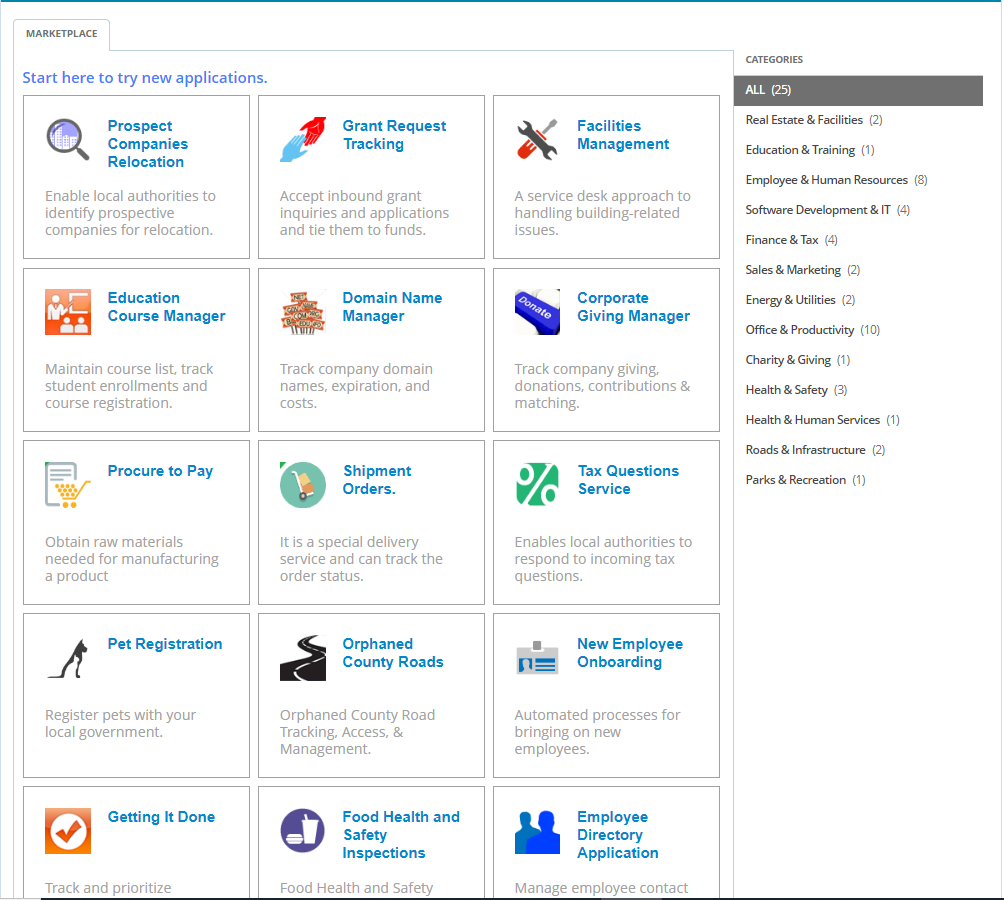Difference between revisions of "Exercise 02: Creating Applications and Defining Objects"
From AgileApps Support Wiki
Wikieditor (talk | contribs) |
Wikieditor (talk | contribs) |
||
| Line 1: | Line 1: | ||
==Introduction== | |||
===Types of AgileApps Applications=== | |||
:* Dynamic Case Management (DCM) Application | |||
:** Automates the handling of Cases, Incidents, or Investigations | |||
:** Allows for process variants for dynamic behavior | |||
:* Service Desk Application | |||
:** An example of a Dynamic Case Management system | |||
:** Specialized to provide additional features for customer support | |||
:* Database (DB) Application | |||
:** A generic Web-based database application | |||
:** Like a spreadsheet but with extra capabilities | |||
===Dynamic Case Management (DCM) Application=== | |||
The front-line of customer, partner, and employee engagement | |||
A case is a unit of work | |||
A case Object can have a different name (other than “case”) | |||
Examples: | |||
:* '''Service Requests''' | |||
:** Customer Service | |||
:** Claims Management | |||
:** Employee, Supplier, and Partner on-boarding & off-boarding | |||
:** Complex, high-value proposals | |||
:* '''Incident Management''' | |||
:** Order Exception Management | |||
:** Complaint Management | |||
:** Dispute Resolution | |||
:** Employee Health and Safety | |||
:* '''Investigations''' | |||
:** Customer Analysis | |||
:** Regulation, Audit requests, and tracking | |||
:** Compliance Tracking | |||
:** Fraud investigations | |||
===Three Ways of Creating an Application=== | |||
:* Start with a sample application and customize it | |||
:* Create a new application: | |||
:** Import your Object and data from a spreadsheet | |||
:* Create a new application: | |||
:** Use the Wizard to start “from scratch” | |||
===Creating an Application from a Sample Application=== | |||
:* Select from many pre-built applications in the Marketplace | |||
:** Software AG owned source of pre-built applications | |||
:** Download for use with cloud tenants only | |||
:** Number of the available application may vary from time to time | |||
<br><br>[[File:Marketplace_Applications.PNG|800px]]<br><br> | |||
:* Customize as required | |||
===Create a New Application by Importing Spreadsheet Data=== | |||
:* Object structure and Data only – no formulas� | |||
:* Paste spreadsheet data | |||
<br><br>[[File:Paste_Spreadsheet_Data.png|500px]]<br><br> | |||
:* OR: Load from File | |||
<br><br>[[File:Load_From_File.png|700px]]<br><br> | |||
===Creating a New Application Using the Wizard=== | |||
:* Use to create a custom application from scratch | |||
:* You specify Object definitions by filling in the form | |||
<br><br>[[File:]]<br> | |||
:* Hint: | |||
:* Type a Field Label carefully (because it is used to create the field name) | |||
:** The label can change - the internal name never does | |||
==Exercise== | |||
In this exercise, you will generate three webMethods AgileApps Cloud applications in three different ways: | In this exercise, you will generate three webMethods AgileApps Cloud applications in three different ways: | ||
:* [[Part 1: Create an Application from an Excel Spreadsheet|From an Excel spreadsheet.]] | :* [[Part 1: Create an Application from an Excel Spreadsheet|From an Excel spreadsheet.]] | ||
Revision as of 13:45, 16 December 2022
Introduction
Types of AgileApps Applications
- Dynamic Case Management (DCM) Application
- Automates the handling of Cases, Incidents, or Investigations
- Allows for process variants for dynamic behavior
- Dynamic Case Management (DCM) Application
- Service Desk Application
- An example of a Dynamic Case Management system
- Specialized to provide additional features for customer support
- Service Desk Application
- Database (DB) Application
- A generic Web-based database application
- Like a spreadsheet but with extra capabilities
- Database (DB) Application
Dynamic Case Management (DCM) Application
The front-line of customer, partner, and employee engagement A case is a unit of work A case Object can have a different name (other than “case”) Examples:
- Service Requests
- Customer Service
- Claims Management
- Employee, Supplier, and Partner on-boarding & off-boarding
- Complex, high-value proposals
- Incident Management
- Order Exception Management
- Complaint Management
- Dispute Resolution
- Employee Health and Safety
- Investigations
- Customer Analysis
- Regulation, Audit requests, and tracking
- Compliance Tracking
- Fraud investigations
- Service Requests
Three Ways of Creating an Application
- Start with a sample application and customize it
- Create a new application:
- Import your Object and data from a spreadsheet
- Create a new application:
- Use the Wizard to start “from scratch”
Creating an Application from a Sample Application
- Select from many pre-built applications in the Marketplace
- Software AG owned source of pre-built applications
- Download for use with cloud tenants only
- Number of the available application may vary from time to time
- Select from many pre-built applications in the Marketplace
- Customize as required
Create a New Application by Importing Spreadsheet Data
- Object structure and Data only – no formulas�
- Paste spreadsheet data
- OR: Load from File
Creating a New Application Using the Wizard
- Use to create a custom application from scratch
- You specify Object definitions by filling in the form
[[File:]]
- Hint:
- Type a Field Label carefully (because it is used to create the field name)
- The label can change - the internal name never does
Exercise
In this exercise, you will generate three webMethods AgileApps Cloud applications in three different ways:


